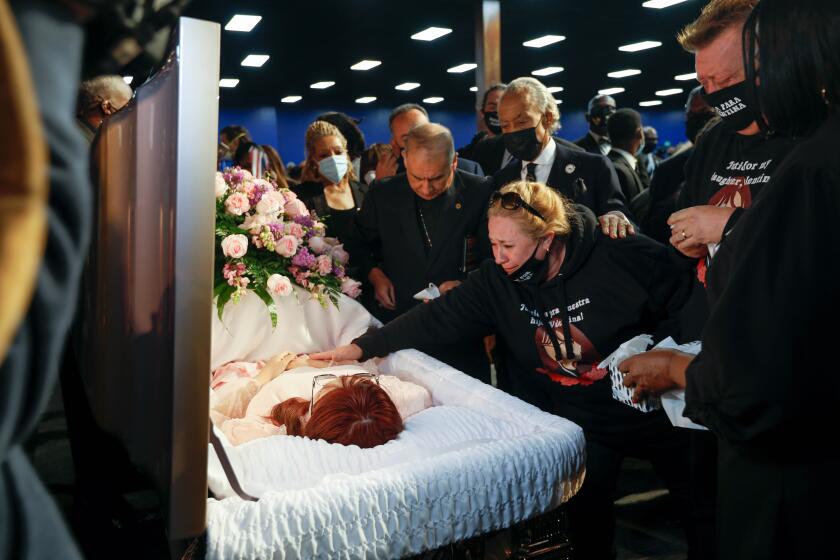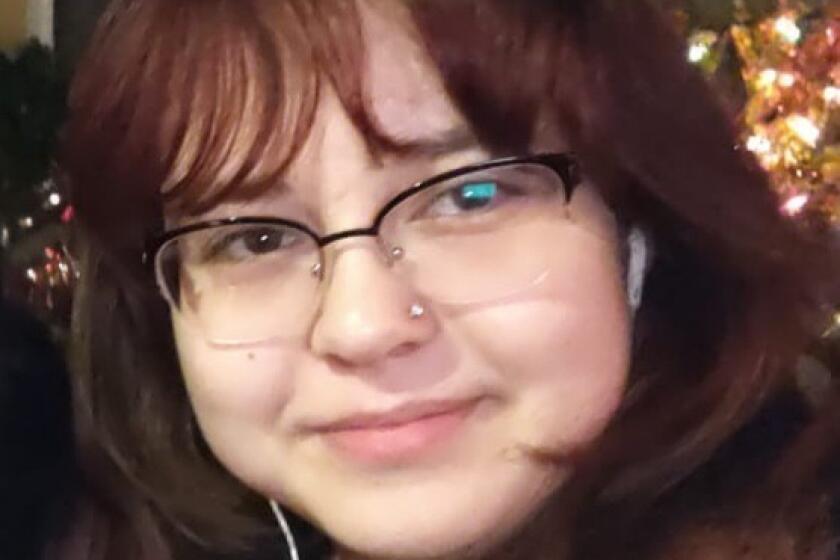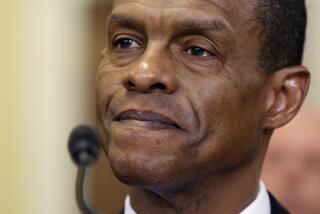Column: The pain and rage over the 14-year-old girl killed by the LAPD? To them, it’s ‘like deja vu’
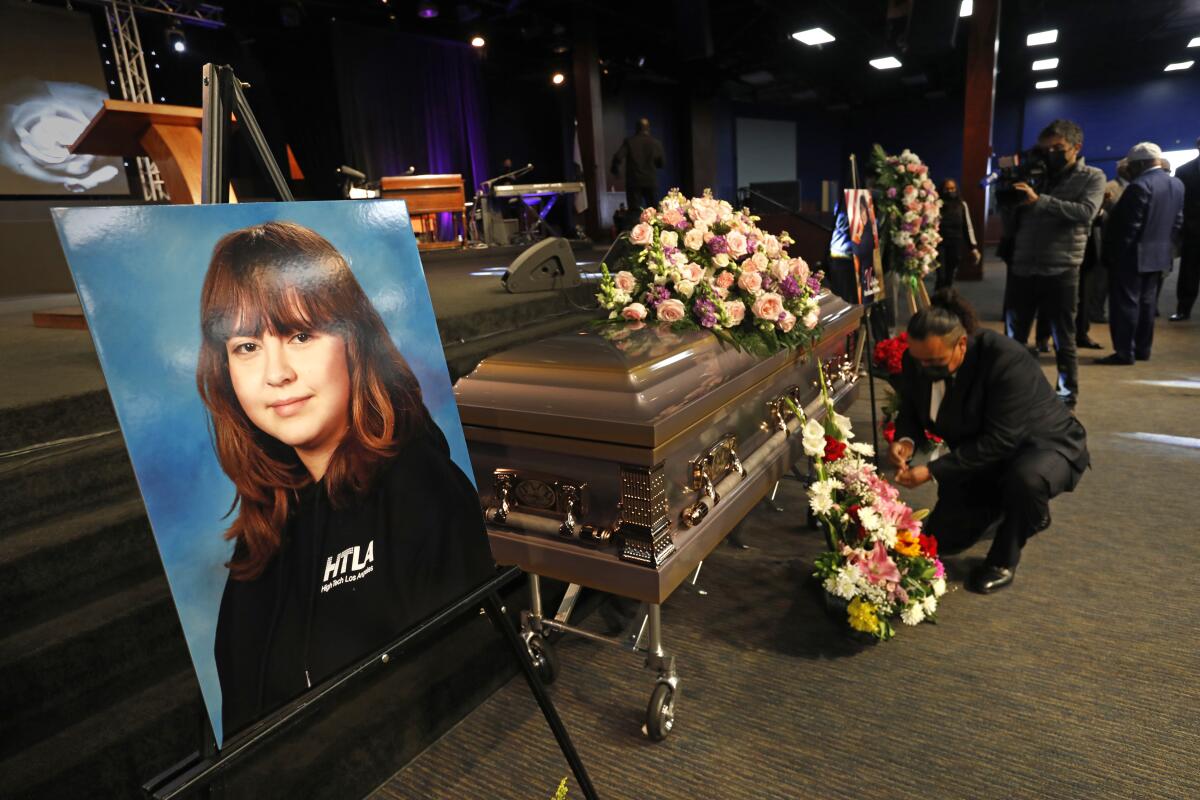
- Share via
It was a little after 11 a.m. on Monday when word came down from some PR person on high that the parents of Valentina Orellana Peralta had finally arrived at the City of Refuge megachurch in Gardena.
Just in time for the media circus otherwise known as their 14-year-old daughter’s funeral.
For the past few minutes, civil rights leaders the Rev. Al Sharpton and attorney Ben Crump had been holding court in one corner of the cavernous room. All around them, journalists jockeyed for position, tilting cameras and recorders for the best angles.
The questions, shouted in rapid succession, were all about police reform, and the answers, first from Sharpton and then from Crump, were all about the need for accountability and justice. It’s the only way, they insisted, to make sure no one else suffers the same fate as Valentina.
The teen was accidentally killed two days before Christmas by a clearly overzealous LAPD officer while shopping with her mother in North Hollywood. Police had been responding to a call about an assault and at least one erroneous report about an active shooter.
“The question is the recklessness of the day,” Sharpton told reporters. “Whatever happened to the word ‘de-escalation’?”
Now Sharpton and Crump, who represented the family of Minneapolis police victim George Floyd and now is representing Valentina’s family, were glancing toward the doors behind them at City of Refuge.
‘My daughter was an angel whose mission was to bring peace and love,’ said Valentina Orellana Peralta’s mother, Soledad Peralta.
That prompted dozens of reporters to head in that direction, coming to a halt in the parking lot just as Juan Pablo Orellana and Soledad Peralta climbed out of a black Mercedes-Benz Sprinter van — the kind used by celebrities instead of working-class immigrants from Chile.
They were wide-eyed and wary, these parents of Valentina — not to mention weary. They wore matching hoodies with their daughter’s image. They didn’t speak as a few reporters lobbed questions in English. The scene was seemingly a world away from the public viewing at Angelus Funeral Home in Crenshaw on Saturday.
Soon, Sharpton was leading the couple through the scrum of cameras to Valentina’s open casket. He touched her forehead and prayed as the cameras rolled. Then Valentina’s mother did the same. Then her father.
Near the back of the room, Albert Corado shook his head as if trying to free himself from a daze.
“It’s really sort of like deja vu,” he told me. “It’s very triggering.”
In 2018, Los Angeles police officers accidentally killed his sister, Melyda Corado, 27, when they opened fire on a man who was running into a Trader Joe’s after a car chase. None of the officers were charged.
“I have been talking to my dad about it and we’re kind of putting ourselves in the shoes of this family,” Corado told me. “They’re being talked to by the media and people are hounding them. And ultimately, the thing that sticks with me is that after this sort of dies down, when Valentina’s not in the news as much, they’re going to be left with this harsh reality that this person’s not here.”
As family and friends settled into their seats at City of Refuge and the gospel music began, Stevante Clark slipped outside to post up in the parking lot. He needed air.
He had come to L.A. to join Crump and support Valentina’s family, in the way that only someone who has had a loved one be killed by law enforcement can. One night in 2018, Sacramento police killed his brother, Stephon, in their grandmother’s backyard, supposedly mistaking a cellphone for a gun. Police weren’t charged in that case, either.
It’s the club to which no one wants to belong.
L.A. Mayor Eric Garcetti and LAPD Chief Michel Moore pledge transparent probes into the fatal shooting of Valentina Orellana Peralta by an officer.
“My heart just breaks for them because with all the media attention around it, all the talk of settlements and stuff, all the press conferences,” Clark said, his voice trailing off for a moment. “I just hope and pray nobody has to meet Ben Crump and Al Sharpton. That’s a bad thing. I don’t think people understand. These families’ lives will never be the same.”
Both Corado and Clark say they know some of what lies ahead for Valentina’s family.
There’s the pain of loss and the rage, and then there’s the tough task of figuring out what to do next. How to turn that pain into something good and how to use the media circus to their advantage.
Corado, for example, channeled his grief into activism and now politics. He is running to unseat City Councilman Mitch O’Farrell in Council District 13, talking about what happened to his sister as part of his campaign to force more changes within the LAPD.
I got to watch Clark go through his process close up because I lived in Sacramento while it was happening. His grief manifested as a slow-moving meltdown, marked by perplexing TV appearances and stints in jail, culminating in Clark throwing himself onto his brother’s casket while Sharpton gave the eulogy.
But months later, he also turned to activism and politics, using the media attention to help to push through Assembly Bill 392, which created one of the toughest standards in the nation for when cops can kill.
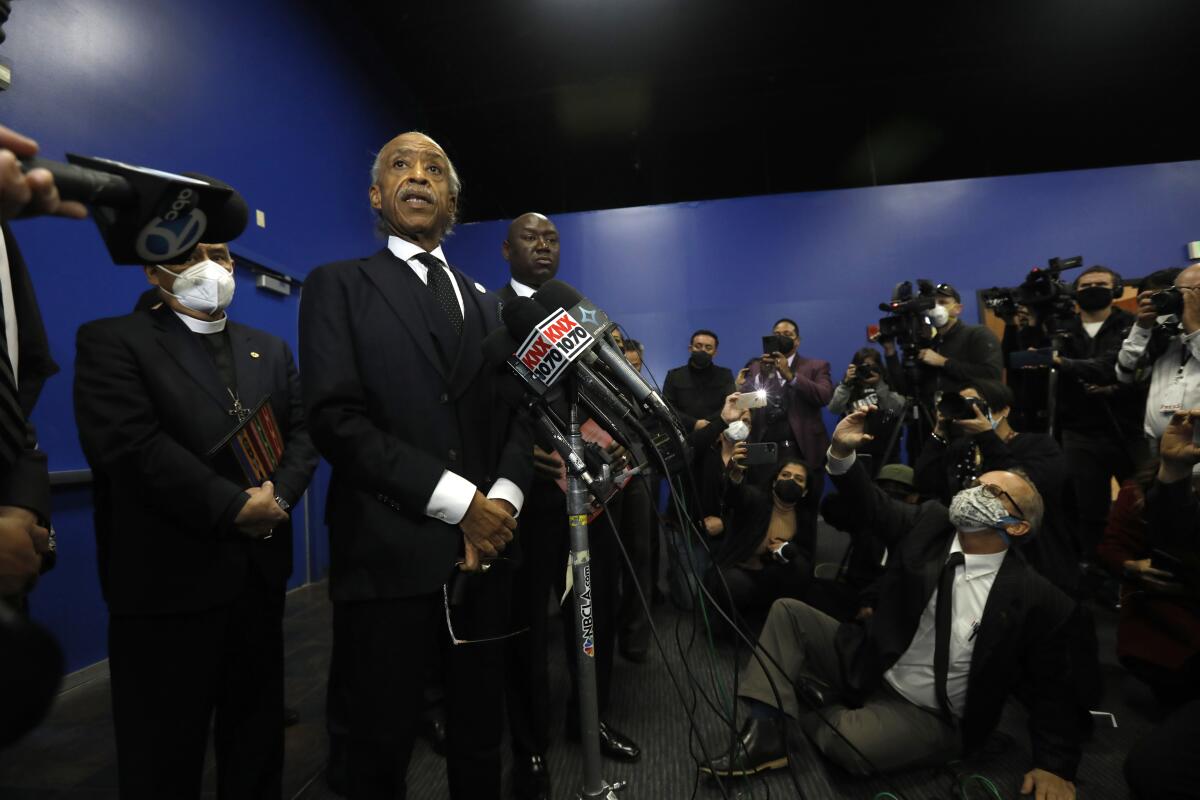
“There’s officers in prison right now for that,” Clark told me. “I think policy and legislative change is one of the only ways to really change this system, especially when it comes to getting actionable items to make sure this never happens again.”
With the death of George Floyd, Stevante Clark’s brother is showing young people in Sacramento how to turn anger into action
But both Clark and Corado acknowledge the limits of working within the system. They are troubled that more hasn’t changed. That poor Valentina and her family have joined their club.
Last week, L.A. Mayor Eric Garcetti vowed that the city would be transparent in its investigation of the teenager’s shooting in North Hollywood, saying that officials are looking at everything from training to tactics to policies.
There’s also some hope that an independent investigation by the California attorney general’s office, as required under a law authored by state Assemblymember Kevin McCarty, will provide another layer of accountability.
“It’s an important issue that we’re getting these investigations out of the people’s hands who have a conflict of interest so we can have fair and transparent investigations into unarmed civilian deaths in the hands of law enforcement,” the Sacramento Democrat said.
That law didn’t exist when the LAPD killed Corado’s sister.
“We can tell you progress is being made,” Crump told reporters on Monday. “Despite tragedies like Valentina and others, we are making progress. Nobody says the road to justice was going to be our overnight journey.”
Valentina’s father seemed hopeful but unconvinced. During his own remarks in Spanish, in which he thanked Crump and Sharpton and the reporters in attendance, he promised to do whatever it takes to fight for justice.
“They have destroyed us as a family,” Juan Pablo Orellana said. “She always told us that this country, that it was the safest country in the world. Unfortunately, she was mistaken. She only came to this country to face her death.”
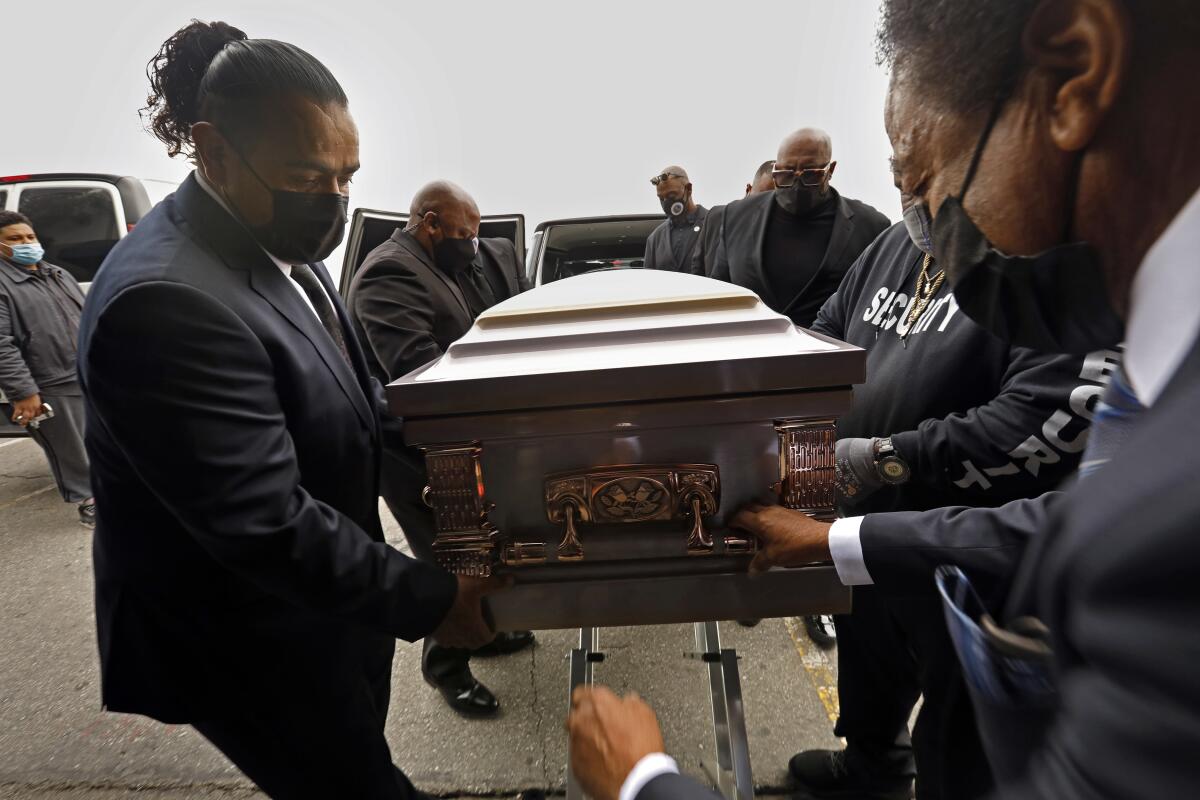
The more things change, the more they seem to stay the same.
“Thirty-one years ago, I came to Los Angeles because LAPD beat a guy on a highway. His name was Rodney King,” Sharpton said during his eulogy for Valentina. “We keep seeing LAPD get it wrong. And here we are again. How long will it take for you to get it right?”
The cameras kept rolling and the reporters didn’t budge as he took one last look at the casket and left City of Refuge, PR people in tow.
More to Read
Sign up for Essential California
The most important California stories and recommendations in your inbox every morning.
You may occasionally receive promotional content from the Los Angeles Times.
